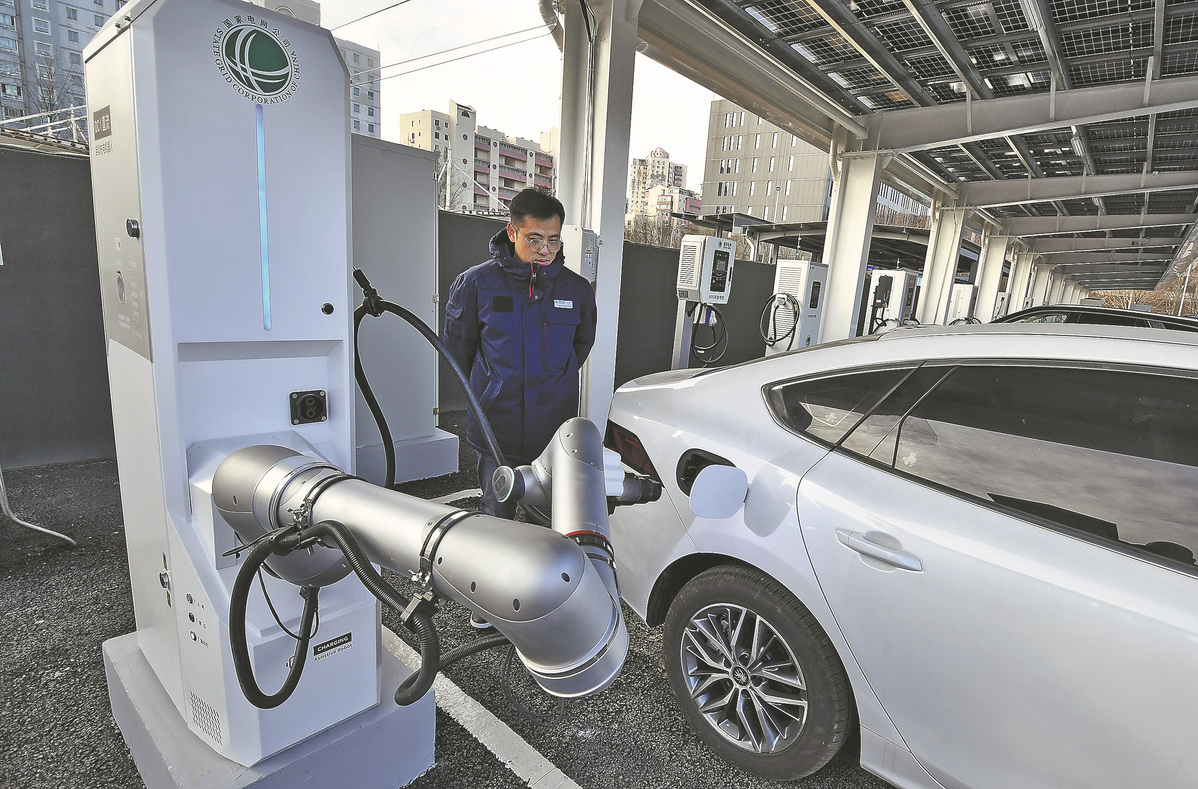
A driver charges his new energy vehicle via a robot charging pile in Beijing. LI XIN/XINHUA
China's electricity consumption, a key barometer of economic activity, is expected to increase by 6 percent year-on-year to 10.4 trillion kilowatt-hours (kWh) this year, as the nation's economy is projected to maintain steady growth in 2025, the China Electricity Council said on Friday.
The country's power consumption rose by 6.8 percent year-on-year to 9.85 trillion kWh in 2024 amid the country's steady recovery and growth, driven by rising demand across various sectors, including high-tech manufacturing and the rapidly expanding electric vehicle (EV) industry, it said.
China's high-tech and equipment manufacturing sectors saw its electricity usage rise by 10.3 percent compared to the previous year, according to Hou Wenjie, director of the council's statistical data center.
This surge has been largely driven by increased production in the sector, including areas involved in electronics, aerospace, robotics, precision machinery and other high-value tech-intensive manufacturing activities where technological advancements continue to spur demand, he said.
Electricity consumption for the production of new energy vehicles (NEVs) saw a remarkable 34.3 percent year-on-year increase last year, due to China's broader push to accelerate the adoption of green technologies as part of its efforts to reduce carbon emissions and shift away from dependence on fossil fuels, he added.
Industry analysts believe the sharp rise in electricity consumption, especially within the high-tech and equipment manufacturing sector, reflects China's commitment to fostering a green economy.
With the automotive industry rapidly transitioning from traditional internal combustion engines to electric vehicles, this surge in electricity demand reflects the growing importance of electric mobility in China's broader environmental goals, said Lin Boqiang, head of the China Institute for Studies in Energy Policy at Xiamen University.
This shift is also a signal of China's overall industrial transformation, where high-tech manufacturing and green energy solutions are becoming central to the economy, he said.
"As the sector continues to evolve, it is expected that the demand for electricity will remain robust, aligning with China's green economic priorities."
According to the council, China's rapidly evolving new energy services industry also contributed significantly to the growth in overall electricity consumption.
The electricity used by charging and battery swapping services saw an extraordinary jump of 50.9 percent in 2024, with total usage reaching 81.1 billion kWh, it said.
Since the beginning of the 14th Five-Year Plan (2021-25), the charging and swapping services sector has maintained an annual growth rate of 62.1 percent, making it one of the fastest growing industries in terms of electricity demand, said Hao Yingjie, a spokesman for the council.
The total number of charging facilities across the country reached almost 12.82 million units by the end of last year, a 49 percent year-on-year increase. Total annual charging volume exceeded 110 billion kilowatt-hours, representing a 38 percent growth compared to the previous year, according to data released by the National Energy Administration on Thursday.
Charging facilities along highways also saw notable progress, with 35,000 charging piles installed in service areas nationwide, achieving 98 percent coverage, it said.
According to the council, the total installed capacity for renewable energy, including wind, solar, and biomass power, reached 1.45 billion kW, surpassing the total installed capacity of thermal power plants for the first time.
This marks a historic shift in the country's energy mix, with renewable energy increasingly taking the lead in driving electricity generation, it said.
China's commitment to expanding and modernizing its power grid infrastructure was also reflected in a significant rise in investment. In 2024, the country's total investment in national grid infrastructure reached 608.3 billion yuan ($83.7 billion), marking a 15.3 percent year-on-year increase. This investment will enhance the grid's ability to accommodate increasing power demand and the growing share of renewable energy in the mix.
zhengxin@chinadaily.com.cn